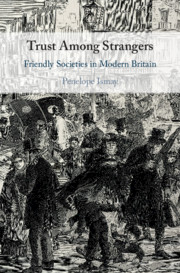Crossref Citations
This Book has been
cited by the following publications. This list is generated based on data provided by Crossref.
Hale, Matthew
Raymond, Graham
and
Wright, Catherine
2019.
List of publications on the economic and social history of Great Britain and Ireland published in 2018.
The Economic History Review,
Vol. 72,
Issue. 4,
p.
1451.
Friedman, Rachel Z.
2022.
Understanding Social Insurance: Risk and Value Pluralism in the Early British Welfare State.
Political Research Quarterly,
Vol. 75,
Issue. 2,
p.
278.
Horrell, Sara
Humphries, Jane
and
Weisdorf, Jacob
2022.
Beyond the male breadwinner: Life‐cycle living standards of intact and disrupted English working families, 1260–1850.
The Economic History Review,
Vol. 75,
Issue. 2,
p.
530.
Andersson, Lars Fredrik
Eriksson, Liselotte
and
Lilljegren, Josef
2023.
Pre-welfare state provision and adverse selection: enrolment in a Swedish nationwide health insurance society.
Financial History Review,
Vol. 30,
Issue. 1,
p.
74.
Rohrer, Ingo
2024.
The Fear of Erring.
p.
39.
Friedman, Rachel Z.
and
Iversen, Torben
2024.
Probabilistic justice against status defense: inequality, uncertainty, and the future of the welfare state.
Theory and Society,
Vol. 53,
Issue. 4,
p.
829.
Rohrer, Ingo
2024.
The Fear of Erring.
p.
141.
Rohrer, Ingo
2024.
The Fear of Erring.
p.
247.
Charpentier, Arthur
2024.
Insurance, Biases, Discrimination and Fairness.
p.
59.
2025.
Modern Britain, 1750 to the Present.
p.
190.



